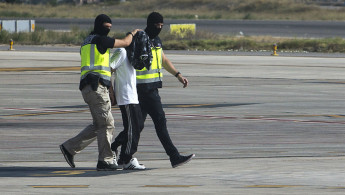Morocco tackling jihadist returnees: anti-terror chief
"We have arrested and brought to justice more than 200 returnees," Abdelhak Khiam, director of the Central Bureau of Judicial Investigations (BCIJ), said in an interview.
Legislation passed in 2015 allows police to arrest and interrogate returnees before transferring them to the judiciary, he said, noting the suspects were serving sentences ranging from 10 to 15 years in prison.
In 2015, an estimated 1,600 Moroccans had joined the ranks of jihadist groups in Iraq and Syria.
"Some died in suicide operations or were shot by (international anti-IS) coalition forces," Khiam said.
"Others fled to other countries."
The North African kingdom has largely been spared jihadist violence since deadly 2003 bombings in Casablanca killed 33 people.
But jihadists of Moroccan origin have been involved in numerous attacks in recent years across Europe, notably France, Belgium and Spain.
Khiam blamed a "problem of religious guidance" in European countries and said "terrorism has no nationality".
Morocco's security efforts have been coupled with major religious reforms, Khiam said.
"This approach based on religious mentoring is important," he added.
Since the Casablanca attacks, Moroccan legislation has been strengthened and dozens of people have been handed prison sentences on terrorism charges.
Authorities regularly announce the dismantlement of "terrorist cells", although such announcements have fallen from 21 in 2015 to nine in 2017.
Khiam also praised the role of international cooperation, saying Morocco's security services had prevented attacks in seven European countries.
But he admitted there may be "gaps" and urged authorities to inform "countries of origin" in cases where dual citizens are suspected of preparing attacks.
He also warned that the vast Sahel region on the southern edge of the Sahara Desert had become a "fertile ground" for jihadist groups and was "a time bomb".
He voiced concern over the links between criminal networks and "terrorist movements" funded by crime.
Insurgents remain active across the Sahel and have been linked to drug, arms and migrant trafficking as well as jihadist attacks.
Terror funding
Last month, French President Emmanuel Macron warned that militants "use all contemporary forms of financing" in an address at the closing of a two-day conference on combating the funding of terror groups at the Organisation for Economic Cooperation and Development (OECD), which brought together around 80 ministers and 500 experts.
"We have to cut off terrorism at its roots: it feeds on human trafficking, drugs and weapons. There's always an underlying economy," said Macron, urging global "transparency and mobilisation."
"We have to cross to a new stage in the fight against Daesh and al-Qaeda,” he said, using the Arabic acronym for the Islamic State militant group.
A French presidential official briefing journalists ahead of the terror funding conference this week said that IS income was estimated at about one billion dollars (820 million euros) a year between 2014-2016.
Most of this was from local taxation, oil revenues and looting, with far smaller amounts flowing in from overseas donors.
IS swept across large parts of Syria and neighbouring Iraq in 2014, declaring a cross-border "caliphate" in areas they controlled.
Syrian and Iraqi forces have since driven IS from nearly all the territory it once held, except for a small presence in the remote desert areas along the border.
But French officials are concerned that the money has been transferred out of Syria and Iraq and could be used to rebuild the organisation.
"It has been moved since, at least in part. It's probably somewhere," the official said on condition of anonymity. "These groups are very skilful in using sophisticated techniques to move financial resources around."





 Follow the Middle East's top stories in English at The New Arab on Google News
Follow the Middle East's top stories in English at The New Arab on Google News


